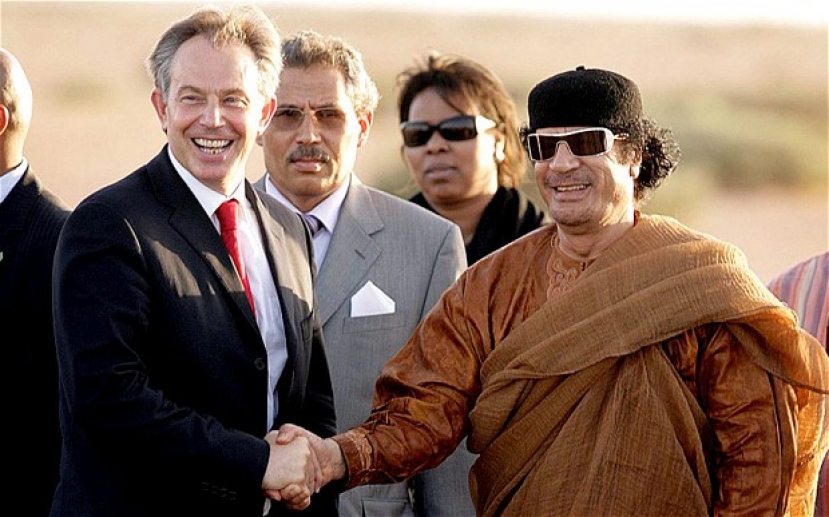Colonel Muammar Gaddafi issued a 'prophetic' warning to Tony Blair that jihadists would attack Europe if his regime was allowed to collapse, phone conversations reveal.
Gaddafi's dire prediction was made in two desperate telephone calls with Mr Blair on February 25, 2011 - as civil war was engulfing Libya.
In the first call at 11.15am, Gaddafi said: "They [jihadists] want to control the Mediterranean and then they will attack Europe."
In the call, lasting half an hour, Gaddafi insisted he was trying to defend Libya from al-Qaeda fighters. The presence of al-Qaedas would later be superceded by the rise of the so-called Islamic State.
"We are not fighting them, they are attacking us, " he said, "I want to tell you the truth. It is not a difficult situation at all. The story is simply this: an organisation has laid down sleeping cells in North Africa. Called the Al-Qaeda Organisation in North Africa... The sleeping cells in Libya are similar to dormant cells in America before 9/11.
"They have managed to get arms and terrify people. people can't leave their homes... It's a jihad situation. They have arms and are terrorising people in the street."
In a second call made a little over four hours later, Gaddafi told Mr Blair: "I will have to arm the people and get ready for a fight. Libyan people will die, damage will be on the Med, Europe and the whole world. These armed groups are using the situation [in Libya] as a justification - and we shall fight them."
Mr Blair had made two calls to Gaddafi to try to negotiate the dictator's departure from Tripoli as civil war engulfed the nation. Three weeks later, a Nato-led coaltion that included Britain, began bombing raids that led to the overthrow of Gaddafi. The dictator was finally deposed in August and murdered by a mob in October.
Mr Blair had a developed a friendship with Gaddafi and had visted the Libyan leader at least six times after leaving Downing Street in 2007.
• 'Dear Muammar': Blair's letter to Gaddafi reveals UK-Libya collusion
• Blair to face MPs over Gaddafi deal that snubbed UK terror victims
He cleared the phone calls with both David Cameron and Hillary Clinton, the then US Secretary of State, in an attempt to persuade Gaddafi to leave Libya with safe passage and to avoid further conflict.
The existence of the phone calls emerged last year and Mr Blair passed the transcripts to the Foreign Affairs Committee which is investigating Libya's collapse. The committee of MPs published the transcripts on Thursday.
In the calls Mr Blair told Gaddafi: "If you have a safe place to go you should go there because this will not end peacefully and there has to be a process of change, that process of change can be managed and we have to find a way of managing it.
"The US and the EU are in a tough position right now and I need to take something back to them which ensures this ends peacefully."
Mr Blair ended the call by saying: "i would like to offer a way out that is peaceful... keep the lines open."
Gaddafi's warnings appear to have been born out. Libya has collapsed following his overthrow. The country remains in the grip of civil war andmuch of it is in the control of Islamist extremists linked to the Islamic State in Iraq and the Levant (Isil).
Terrorists sent by Isil to France were responsible for the attacks on Paris in November amid growing concern jihadists are crossing into Europe from north Africa and the Middle East.
Crispin Blunt MP, Chair of the Committee, said: "The transcripts supplied by Mr Blair provide a new insight into the private views of Colonel Gaddafi as his dictatorship began to crumble around him.
"The failure to follow Mr Blair’s calls to 'keep the lines open' and for these early conversations to initiate any peaceful compromise continue to reverberate.
"The Committee will want to consider whether Gaddafi’s prophetic warning of the rise of extremist militant groups following the collapse of the regime was wrongly ignored because of Gaddafi’s otherwise delusional take on international affairs.
"The evidence that the Committee has taken so far in this inquiry suggests that western policy makers were rather less perceptive than Gaddafi about the risks of intervention for both the Libyan people and the western interests."

